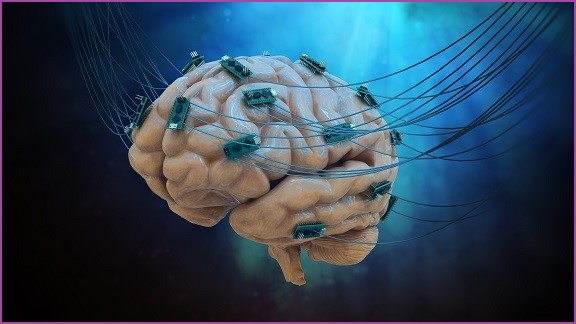The Royal Society has called on UK government bodies to begin regulating neural interfaces.
Also known as brain-computer interfaces (BCI), neural interfaces are technologies that interact directly with the brain through direct stimulation of nerves and neurons or by interpreting outputs like brainwaves.
In its iHuman report, Britain’s centuries-old scientific institution pontificated on the potential for BCIs to radically transform humanity.
“Linking human brains to computers using the power of artificial intelligence could enable people to merge the decision-making capacity and emotional intelligence of humans with the big data processing power of computers, creating a new and collaborative form of intelligence,” the report said.
“People could become telepathic to some degree, able to converse not only without speaking but without words – through access to each other’s thoughts at a conceptual level.
“This could enable unprecedented collaboration with colleagues and deeper conversations with friends.”
Cochlear implants are a common example of a neural interface. They connect directly to hearing nerves, transmitting sound from speakers just outside the ear and can even be hooked up directly to a smartphone.
The promise of BCI technology has been gaining mainstream momentum with Elon Musk’s company, Neuralink, and Facebook both releasing more information about their projects in recent months.
It doesn’t take a brain surgeon to foresee the risks associated with this emerging technology.
The Royal Society raised concerns around privacy, inequality, and the very nature of what it is to be human – problems which it urges governments to address “early and often”.
“The UK should use neural interfaces as a test case for a new democratised and anticipatory approach to promoting emerging technologies,” it said.
“The general public should be given a clear voice in shaping the future of neural interface regulation.”
But the Royal Society also wants to see development encouraged through “regulatory ‘sandboxes’ in which innovators can test products in a controlled environment with limited regulation”.
On the Australian BCI frontier
Professor Chin-Teng Lin, from the University of Technology Sydney, has been working in the field of BCI research for over a decade.
He told Information Age he was confident the future of everyday computing will be through a direct connection with our brains.
“The BCI will be the next generation of human-computer interface,” Lin said confidently.
“For a long time, the keyboard was the major interface. Now we have portable devices – phones, tablets – so touch panel interfacing is important.
“In the future everything will be wearable. You will have sensors embedded in earphones and glasses so we can easily detect the brain signal.”

Professor Chin-Teng Lin. Photo: University of Technology Sydney
Measurements of your cognitive state can be used to adjust your experience with other software. The content of video games, for example, could change depending on your levels of attention or excitement.
Professor Lin has been working on a project to incorporate BCI for everyday uses like GPS.
“The navigation information will be displayed on your glasses – it is just in front of you,” he said.
“So then we can use BCI technology to detect your cognitive state and know how lost you are and provide more information. It becomes more personalised.”
Because this is a field that is seeing a lot of development, Professor Lin thinks Australia is in a unique position to take centre stage on BCI.
“From an academic perspective, of course I would like to see more research funding and more support,” he said.
“From a clinical point of view, I feel we are very good at medical technology so the treatment of brain-related diseases is how Australia could take the lead.
“Especially now with how often we are talking about mental health.”
Professor Lin identified that privacy will be especially important as the technology evolves.
"With currently technology this is not so much an issue," he said. "We are just trying to identify intention at a higher level.
"There is a big trend in BCI around decoding the language area of the brain so some day in the future we can decode what you're trying to say. Then the information will be quite in-depth so brain security technology will be an important area."










